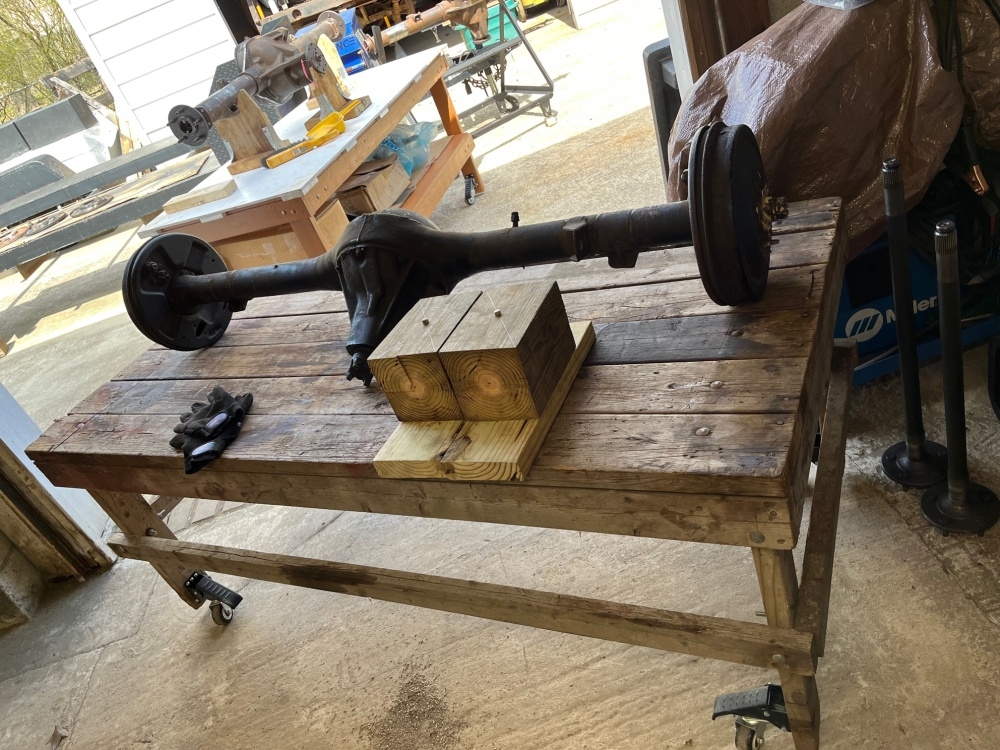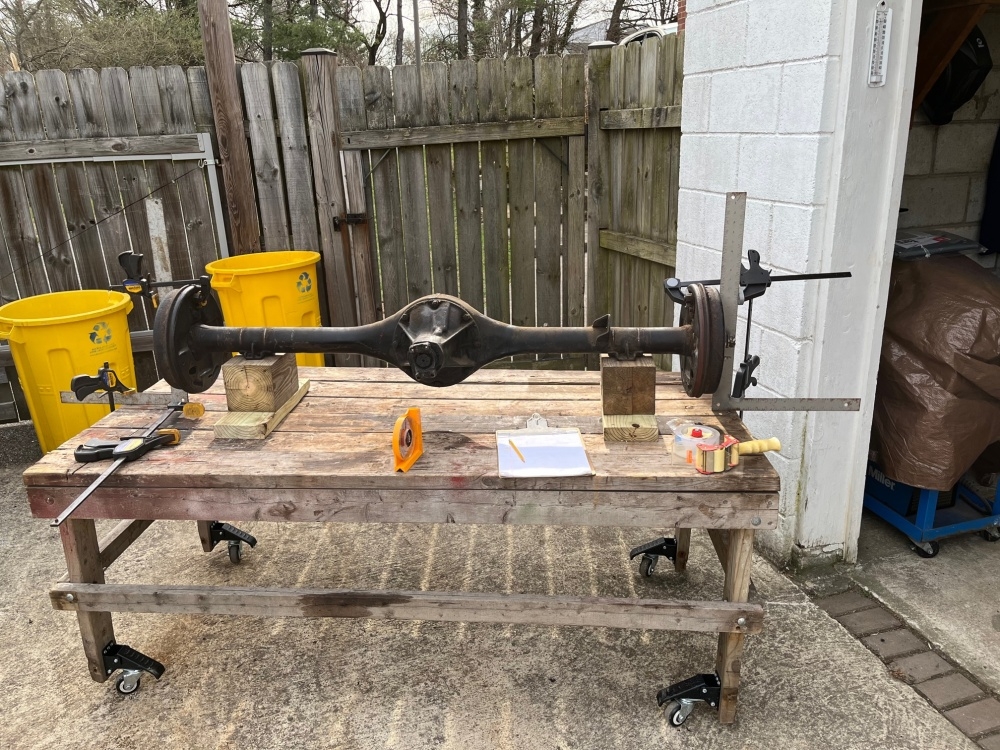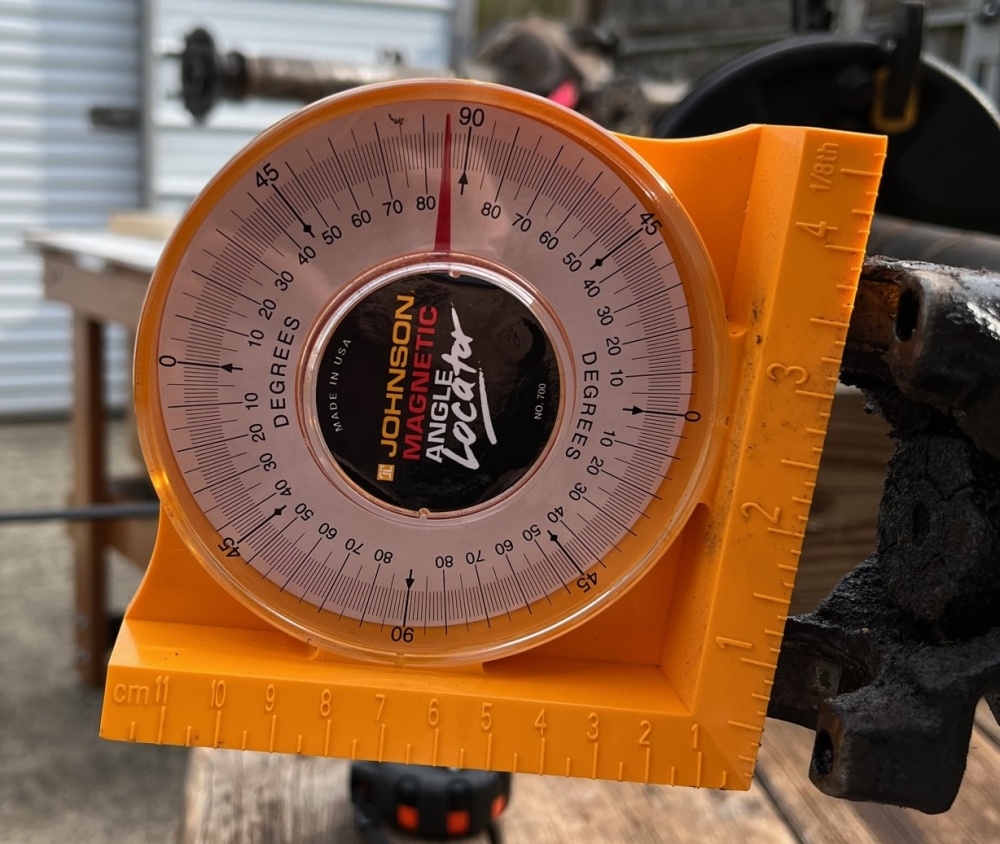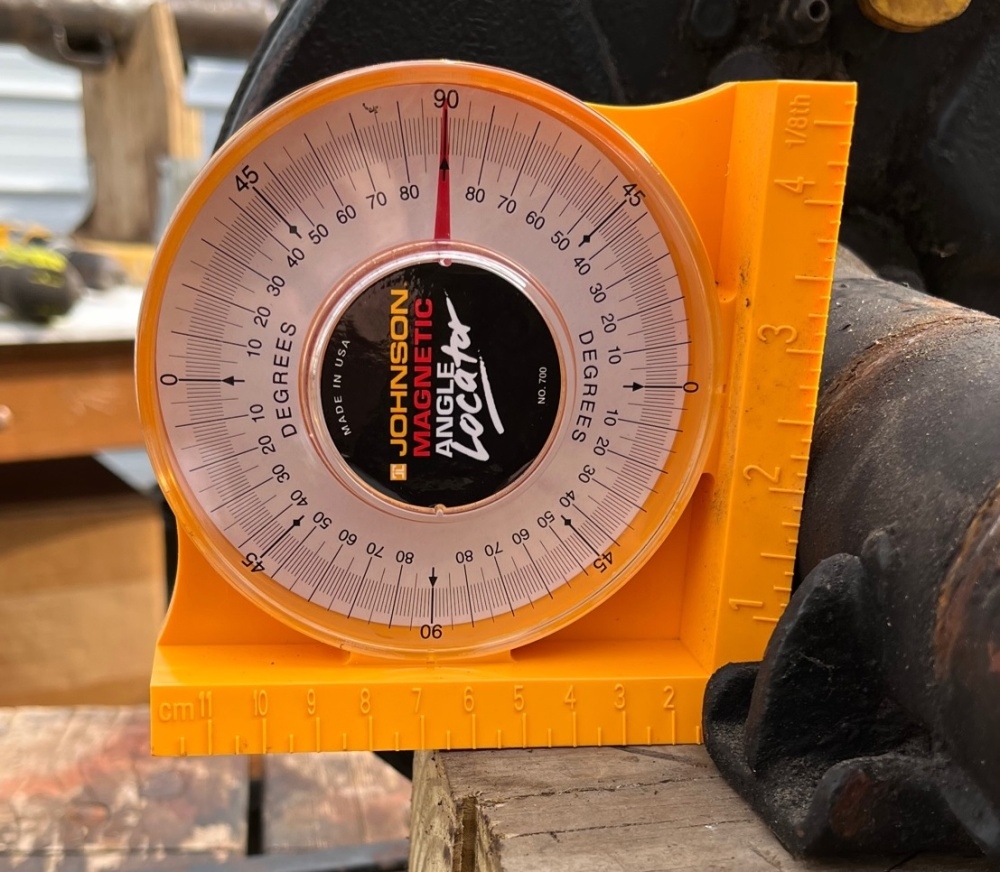Obtaining '46 Hudson Pickup Differential Measurements -

46HudsonPU
Administrator
Am doing this for a 'ready reference' - Anyone reading it can 'take it for what it's worth'..
Working from an old workbench. I fashioned a couple of blocks to hold, support and center the old '46 Hudson pickup differential. I drilled & installed 1/2" pins in the blocks to 'center' the spring perches & hold the differential in-place, for measurements (blocks with pins seen in picture below):

Old differential in photo below. Once I got the differential on the blocks and resting (centered on the pins), I secured the supporting blocks to the workbench with a few 3" decking screws - so they wouldn't move. I then clamped a couple of carpentry squares to the WMS, to accurately measure the width of the rear -

From there, I also took a look at the pinion offset - 5 degrees, as shown in the photo below:

And made sure that the differential was sitting level (90 degrees) on the workbench - just to be sure..

So, for what it's worth (FWIW) -
- The bolt pattern on the '46 Hudson wheels is: 5 X 4.5"
- The width of the differential/rear end is: 60 3/4" WMS to WMS
- The pinion angle is: 5 degrees
- The 'leaf spring perches width' is: 41 1/2"
(as measured from the centers of the 'centering hole' in the spring perches)
It is my understanding that most (if not all) 40's Hudson vehicles all have very, very similar rear end / leaf spring dimensions - about all they did was change the gearing & spring load capacity. These measurements should work for coupes, sedans, convertibles (?), as well as the commercial series. However, don't take my 'word' for it - do your own measuring..
------------------------------------------------------------------------
Now, as to "WHY would you go through all that trouble?"
The answer is simple.
I'm planning to install a more modern differential in one of my Hudson pickups, and am using an old differential (from another '46 Hudson pickup) as a template to make a 'jig'. The measurements? Purely for my reference, but thought I would take the time to document it, and my process.
I have already used this 'template' to position (center) the spring perches on the replacement differential (to include the pinion angle), and even tack-welded the spring perches in place while it was sitting on the 'jig'.
Didn't need to worry about properly spacing the spring perches, just make sure the measurement was to the drum backing plates was the same, left and right & made sure the pinion angle was correct.
Working from an old workbench. I fashioned a couple of blocks to hold, support and center the old '46 Hudson pickup differential. I drilled & installed 1/2" pins in the blocks to 'center' the spring perches & hold the differential in-place, for measurements (blocks with pins seen in picture below):

Old differential in photo below. Once I got the differential on the blocks and resting (centered on the pins), I secured the supporting blocks to the workbench with a few 3" decking screws - so they wouldn't move. I then clamped a couple of carpentry squares to the WMS, to accurately measure the width of the rear -

From there, I also took a look at the pinion offset - 5 degrees, as shown in the photo below:

And made sure that the differential was sitting level (90 degrees) on the workbench - just to be sure..

So, for what it's worth (FWIW) -
- The bolt pattern on the '46 Hudson wheels is: 5 X 4.5"
- The width of the differential/rear end is: 60 3/4" WMS to WMS
- The pinion angle is: 5 degrees
- The 'leaf spring perches width' is: 41 1/2"
(as measured from the centers of the 'centering hole' in the spring perches)
It is my understanding that most (if not all) 40's Hudson vehicles all have very, very similar rear end / leaf spring dimensions - about all they did was change the gearing & spring load capacity. These measurements should work for coupes, sedans, convertibles (?), as well as the commercial series. However, don't take my 'word' for it - do your own measuring..
------------------------------------------------------------------------
Now, as to "WHY would you go through all that trouble?"
The answer is simple.
I'm planning to install a more modern differential in one of my Hudson pickups, and am using an old differential (from another '46 Hudson pickup) as a template to make a 'jig'. The measurements? Purely for my reference, but thought I would take the time to document it, and my process.
I have already used this 'template' to position (center) the spring perches on the replacement differential (to include the pinion angle), and even tack-welded the spring perches in place while it was sitting on the 'jig'.
Didn't need to worry about properly spacing the spring perches, just make sure the measurement was to the drum backing plates was the same, left and right & made sure the pinion angle was correct.
0
Comments
-
Many years ago when Ford 9 inch rear ends were popular I used a 1971 Cougar drum to drum rear axle - only had to have the spring perches repositioned. Had it in my 1947 Hudson pick-up with 1956 Hornet engine. The wheel pattern and u-joint matched as I recall. Worked well. I know there are other newer RA that will work but I have no experience there. Easily changed from 3:1 to 3:50 was better with my OD trans. Gert0
-
I have two (2) ford 8.8" rears I am working-on at present. Both are from the same model vehicle, one has 3.27 'open' gears, the other has 3.73 with 'limited slip' gears. Both have the larger drum brakes. Figured as long as I was doing 'one', I might as well rebuild both, at the same time. More on that, when the time comes to actually 'install' one of them on the truck. FYI - the one with 3.27 is currently the 'rear of choice' for the '46 (currently has original engine & trans).Courtesy Man said:Many years ago when Ford 9 inch rear ends were popular I used a 1971 Cougar drum to drum rear axle - only had to have the spring perches repositioned. Had it in my 1947 Hudson pick-up with 1956 Hornet engine. The wheel pattern and u-joint matched as I recall. Worked well. I know there are other newer RA that will work but I have no experience there. Easily changed from 3:1 to 3:50 was better with my OD trans. Gert
I built a simple Excel spreadsheet that gives me the MPH, from engine speed, trans & rear gearing, along with the tires' RPM (revolutions per mile). I just change the parameters and it calculates what can be expected. Also helps with selection of tires too (many manufacturers put tire RPMs in their online specifications - tirerack.com publishes this info on most of their tires - Cokertires.com does not).
Those 9" rear ends have become a thing of myth and legend, as well as being very, very scarce and overly expensive. Nowadays, if a 9" rear is a 'must have', the cost is such that you might as well get a custom rear made.
That being said, there are many, many 'alternatives' - ford's 8.8" (or even the 7.5") being the predominant leader of the pack. Some online research will find LOADS of lists of rears, most with the critical measurements needed (WMS dimensions, wheel mounting info, etc.), and even choices of drum & disk.
FYI - For those contemplating a differential 'swap', drum brakes are advised, unless you plan to convert your front brakes to disc as well. While discs in the front and drums in the rear can be made to work (and will work well, with a proportioning valve installed), the same is not a 'sure thing' (by any means) with drums up front and discs in the rear (?).0 -
Just temporarily mounted the new drums to the 'replacement' differential, and re-measured the WMS to WMS = 59 1/4".
The math: (old/original) 60 3/4" - (replacement) 59 1/4" = 1 1/2" narrower (3/4" at each wheel).
As I recall, this wasn't an issue - That's what I had determined, years ago. When I have a chance, I'll crawl under the '46 & re-scope it out. I KNOW I did this quite some time ago, but don't remember - and can't find my notes..0
Categories
- 37K All Categories
- 116 Hudson 1916 - 1929
- 21 Upcoming Events
- 96 Essex Super 6
- 28.6K HUDSON
- 576 "How To" - Skills, mechanical and other wise
- 995 Street Rods
- 151 American Motors
- 181 The Flathead Forum
- 49 Manuals, etc,.
- 78 Hudson 8
- 44 FORUM - Instructions and Tips on using the forum
- 2.8K CLASSIFIEDS
- 609 Vehicles
- 2.2K Parts & Pieces
- 78 Literature & Memorabilia
- Hudson 1916 - 1929 Yahoo Groups Archived Photos